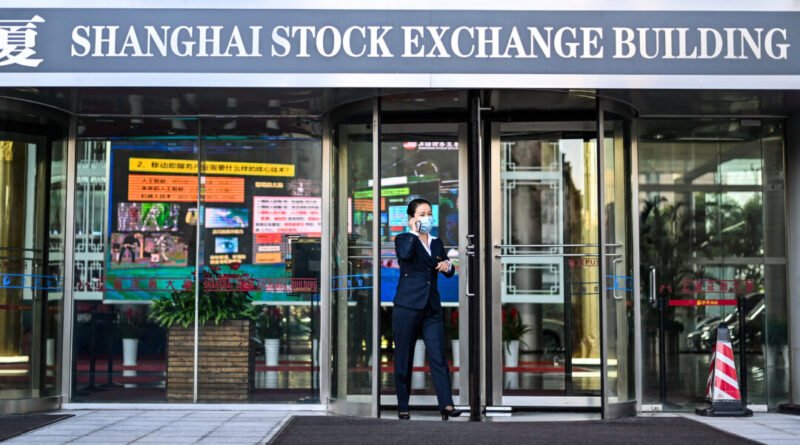China Imposes Limits on Trading Information Regarding Foreign Capital Movements
Stock exchanges have stopped releasing real-time data on foreign funds buying Chinese stocks, a crucial indicator for investors.
Beijing has limited the daily release of data on overseas funds flowing into China as foreign investments diminish.
Since Aug. 19, the Shanghai and Shenzhen stock exchanges have halted the real-time release of data on foreign funds purchasing Chinese stocks, a significant metric for investors. Instead, China’s central bank will now release information on financial assets held by overseas entities quarterly.
Per the new data release regulation from China’s ruling Communist Party (CCP), the total transaction amount and number of transactions will be announced only after the market closes each trading day.
Under the new directive, for “northbound” trades, originating from Hong Kong via the Hong Kong Stock Connect to Shanghai and Shenzhen exchanges, the quota balance for the day will be disclosed in real-time only when the remaining balance is less than 30 percent on the same day. If the remaining quota is above 30 percent, only “sufficient quota” will be displayed, with the remaining quota undisclosed.
Through the Shanghai-Hong Kong Stock Connect, foreign investors can trade Shanghai Stock Exchange stocks in Hong Kong, while Shanghai investors can engage in Hong Kong-listed stock transactions in Shanghai, following the same process with the Shenzhen-Hong Kong Stock Connect.
The disclosure terms for real-time trading data of the Shanghai and Shenzhen stock markets have been discontinued, cutting off information on foreign funds investing in China’s A-shares via Hong Kong.
Public data indicates that foreign direct investment (FDI) in China declined by 29.1 percent in the first half of this year compared to the previous year. In 2023, China’s FDI totaled $33 billion, an 82 percent decrease from 2022, marking the lowest level since 1993.
Negative Impact on Investors’ Confidence
W. Paul Chiou, a finance professor at Northeastern University in Boston, stated to The Epoch Times on Aug. 19 that Beijing’s action suggests an effort to conceal China’s financial market’s dire situation.
He remarked, “The CCP has tried to prop up the stock market, with little success. Observing foreign capital leaving will further dampen investor confidence in investing.”
Chiou highlighted that China lacks transparency in information and data, noting that a similar issue has arisen in the past.
“Suspending the release of various statistics without explanation masks the truth, hindering China’s economic advancement and investors’ ability to evaluate China’s economic well-being,” he added.
Economist Davy J. Wong told The Epoch Times on Aug. 20 that the new restrictions will discourage the international community from investing in Chinese markets.

An electronic screen displays (from top) the Hang Seng Index, Hang Seng China Enterprises Index (HSCEI), Hang Seng Tech Index, and MSCI China Index in Hong Kong on March 15, 2022. Paul Yeung/Bloomberg via Getty Images
“Foreign investors mainly invest in funds and enterprises. Short- and medium-term foreign investors will reduce transaction frequency due to the absence of reliable real-time data,” he noted.
For medium- and long-term investors who rely on real-time data for decision-making, he added, “Without real-time data, verifying the accuracy of final published data becomes impossible.”
“Thus, medium- and long-term investors are likely to exercise more caution, potentially reducing their investment transaction frequency and diverting some investments away from China,” he concluded.
Chiou enumerated reasons for the outflow of foreign capital from China.
He stated, “Restricting the release of real-time data heightens market uncertainty and diminishes market transparency. The primary factor influencing foreign capital inflow and outflow is China’s investment prospects,” emphasizing that China’s current economic growth forecast is a significant driver of foreign capital flight.
Despite these contradictory moves, CCP authorities emphasize the importance of China engaging in global trade. On Aug. 19, the State Council approved two documents aimed at attracting and facilitating foreign investments.
Regarding Beijing’s conflicting actions, Wong noted they align with the CCP’s political goal of maintaining regime stability.
He elaborated, “The CCP desires openness for foreign-funded enterprises and orders to support the regime, yet it fears that foreign capital and companies may introduce foreign culture, impacting the CCP’s societal control.”
Chiou remarked that the CCP is attempting to blend socialism and a market economy, which are fundamentally divergent. He highlighted the contradictions in the CCP’s economic policies arising from this mismatch.
Luo Ya contributed to this report.






